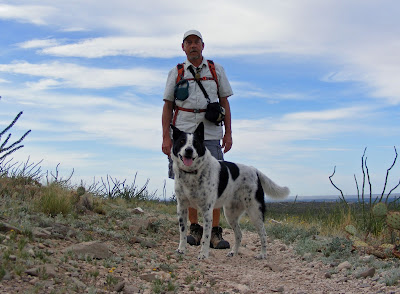 |
| Rough Menodora |
Becca and I did a slightly-abbreviated hike this morning before returning home, packing (she had more to do than me), and heading to High Rolls in the Sacramento Mountains. Because we had a lot of supplies to bring along, Dr. K drove her car, too, loaded down with low desert booty (pun unintended). She carted ten gallons of drinking water in addition to other staples. Even though our well water is potable and is filtered in two separate places--before the jet pump and by Brita filter at the sink faucet--we use the bottled water for drinking and cooking because our well water has a slightly "slippery" feel to it (and we don't have a water softener). I believe the feel comes from clay at the bottom of the well, but I don't know for certain.
We're in the high country for days of mountain hikes, if we can avoid the rain. It's already been raining here today. And, according to our rain gauge, we've had nearly 3" of precipitation since we were last here. We always welcome the rain, but it's created more yard work for us.
 |
| Headed for the high flank |
 |
| Plumed Crinklemat |
 |
| Tequilia greggi (Plumed Crinklemat) |
 |
| One big dog |
 |
| Plumed Crinklemat, Prickly Pear Cactus, Ocotillo and Torrey Yucca |
 |
| Plains Sunflower and bud |
 |
| I adjusted the hue on this image, but don't like the result |
 |
| Almost looks like a reflected flower, but it's two daisies |
 |
| Desert Zinnia, Prickly Pear and Becca |
 |
| Purple sage at our Chihuahuan Desert residence |
 |
| In the high country |
 |
| The Sacramento Mountains |
 |
| Oh, Sweet Pea, won't you dance with me? |















5 comments:
Artistic photos of the chocolate daisies, Packrat. It's nice to be up in the high country again.
My bad, Dr. K. I believe what I at first captioned as a Chocolate Daisy is, in fact, a Plains Sunflower. Duh--stupid me.
:)
I'm telling you, Packrat, your musical allusions keep dating you... :-) We're getting much needed (but gentle) rain here in the northern Piedmont today (Tuesday); it's been sunny, hot and dry for about two weeks, so the ecosystem needs a drink.
Packrat: Thanks for the link to the Youngstown/Mill Creek sewers article. Collection mains like the one described in the article are common throughout the country--heck, the streams flow at the lowest points, and it's easy to gravity-feed sewage to the lowest points, too. In Philadelphia, many of the original streams were simply enclosed in enormous pipes because they had become open sewers. Even in some of the less egregious examples (where storm drains and sanitary sewers are combined in the same pipe and "only" overflow when the storm drains are flooded by rainstorms), the creeks are in poor condition because rainstorms overwhelm the pipes so frequently that the creeks are inundated with untreated sewage on a fairly frequent basis.
Philadelphia, to its credit, decided to respond to an EPA sanction to clean up its streams by attempting to infiltrate rainwater into the ground at its source rather than collect it and pipe it off to streams. Thus, there are many, many stormwater management projects scattered all over the city, and the city levies a stormwater management tax on all landowners; the rate is based on the amount of impervious coverage on your property. Car dealers, for example really get it socked to 'em.
In contrast to this "manage it at its source" approach, my home town of Garfield Heights, Ohio decided to gather all the storm and sanitary drainage into gigantic caverns excavated under the streets. The caverns store the water during storms and then gradually bleed it to the wastewater treatment plant when the storm has passed and the plant can handle the load.
I don't know which approach is best or most cost effective, but at least they're doing something.
Thanks for that information, Scott; really interesting to learn about these different approaches. Horrifying to hear about streams being enclosed in pipes because they had become open sewers. Often I feel as if we have already grown beyond the carrying capacity of our ecosystem.
Post a Comment